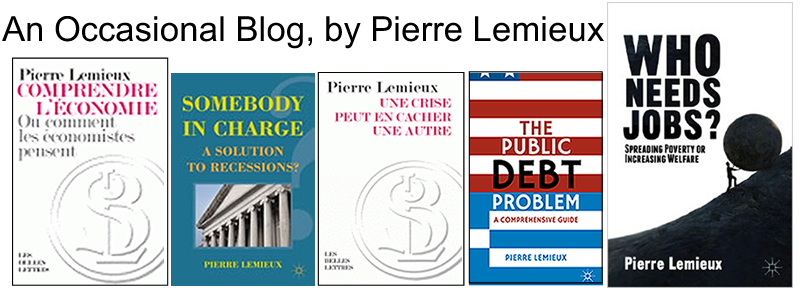Why did the Great Depression start in the U.S.? One could think it was just an outlier, but the recent (and continuing) Great Recession suggests otherwise.
This phenomenon is puzzling, especially in light of a second one: for several generations, the American economy has been the world template for economic growth and opportunities. Part of the secret lied in the inventiveness and entrepreneurship that have been defining characteristics of Americans. Whole new industries were born in America, from petroleum, to cars, computers, cyberspace, and smart phones.
Instead of being contradictory, perhaps these two phenomena are intimately related. Perhaps American entrepreneurship and inventiveness wreak havoc when transferred to the political realm.
The problem with American law makers is that they bring innovation and entrepreneurship to their job. Activism is implied by the concept of “law maker”. According to Nobel prizewinning economist Friedrich Hayek, the constant manufacturing and modification of laws embodies the conceited social engineering of our time. Regulatory bureaus add insult to injury.
Last year, the Federal Register contained 82,589 pages of rules, proposed rules, notices, and executive orders, without counting actual laws. Data from the Mercatus Center and the Weidenbaum Center show that, from 1960 (before the start of the crisis) federal regulatory budgets were multiplied by 11 in constant dollars, excluding Homeland Security.
Consider the recent recession. One of its major causes was the continuous social-engineering of the housing market by the federal government, from Franklin D. Roosevelt to Bob Clinton, and George W. Bush. That the GSEs invented and promoted mortgage-backed securities is only one illustration of the practical nationalization of the residential and housing market before the crisis. Just five years before this house of card collapsed, Rep. Barney Frank (D., Mass.) declared: “I would like to get Fannie and Freddie more deeply into helping low-income housing and possibly moving into something that is more explicitly a subsidy. . . . I want to roll the dice a little bit more in this situation towards subsidizing housing.”
From 2001 to 2004, the Fed’s expansionary monetary policy threw fuel on the fire.
American politicians and bureaucrats then reacted to the immediate crisis with their usual quick inventiveness and trigger-happy entrepreneurship. The Fed aggressively moved in, sometimes with policy tools that many people did not even realize it had (secret bail-outs and quantitative easing). Washington politicos rushed in to bail-out everybody in sight. A very entrepreneurial bureaucrat, Treasury Secretary Hank Paulson changed the focus of the Troubled Assets Relief Programs three times in three months.
Back to the future. Politicians, bureaucrats and prosecutors are still busy blaming anybody but themselves, and trying to correct their own mistakes with still more laws and regulations. The Dodd-Frank Act is remarkable not only by its main sponsors, who were among the most activist card-castle engineers, but by its innovative 2300 pages – not counting the regulations that the bureaucrats are still working on.
The same sort of political and bureaucratic entrepreneurship was observed before and during the Great Depression. Economics professor Thomas Rustici argues that the protectionist Smoot-Hawley Act, which had been debated in Congress several months before the stock crash of October 1929, was a major cause in the depression. A good argument can be made that the Great Depression would have remained an ordinary recession if government had not also increased taxes, boosted expenditures, and regulated everything in sight. Franklin D. Roosevelt created many of the institutions, including entitlements and Fannie Mae, that would slowly gather the steam necessary for future troubles.
This legislative and regulatory entrepreneurship of the 1930s was not new in America. Banking crises – a major feature of the Great Depression – were the product of an atomised banking system created decades before by unit-banking laws at the state level and federal regulation of interstate banking (see Charles Calomiris’s book U.S. Bank Deregulation in Historical Perspective).
The entrepreneurial spirit of American politicians and bureaucrats also brought deposit insurance, an American invention of 1934 (although some state governments had tried it before), which generated an intractable moral hazard problem. Before 1960, America was the only developed country without deposit insurance; in 2004, about half the countries still had not followed America’s leadership in this field. Some leadership!
As poet and folk singer Leonard Cohen says, America is the “cradle of the best and the worst”. Nowhere perhaps is this better seen than in entrepreneurship. Its economic version has created bounties. Its political and bureaucratic implementations, often among the worst in the Western world, have had the opposite consequences.
